Endorsing Palestinian statehood in the midst of genocide and enforced starvation
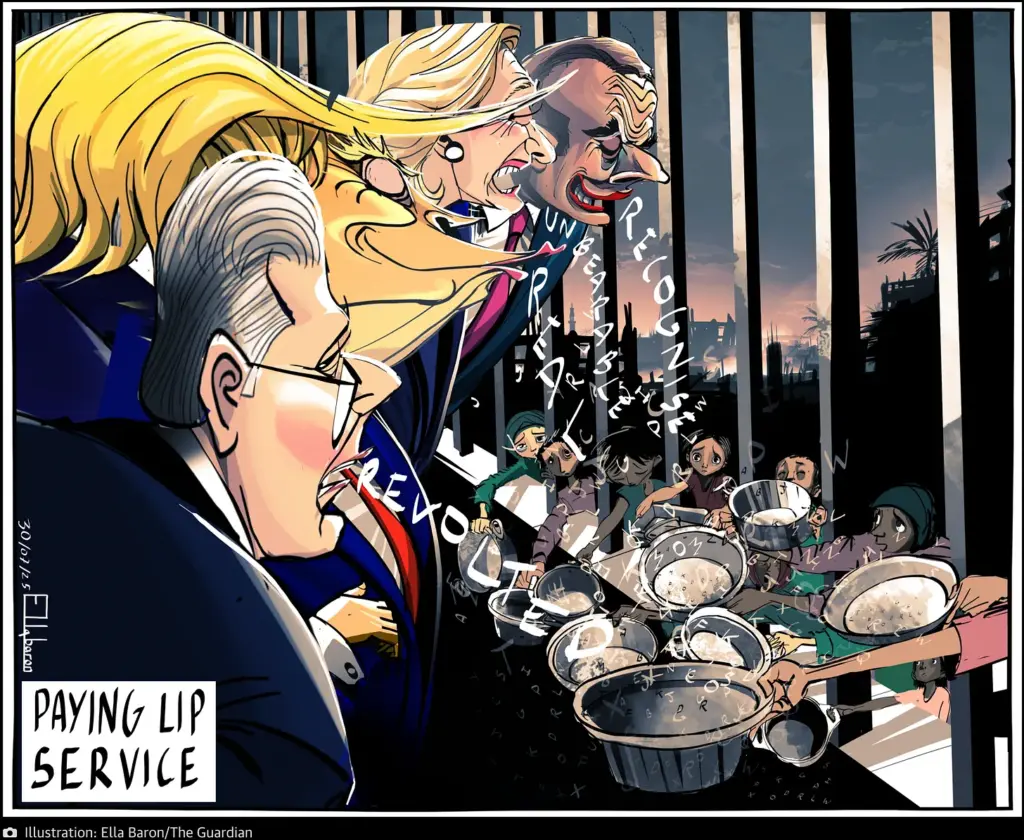
Canadian PM Mark Carney says he will recognize Palestine as a state. But what do Palestinians in Canada think?
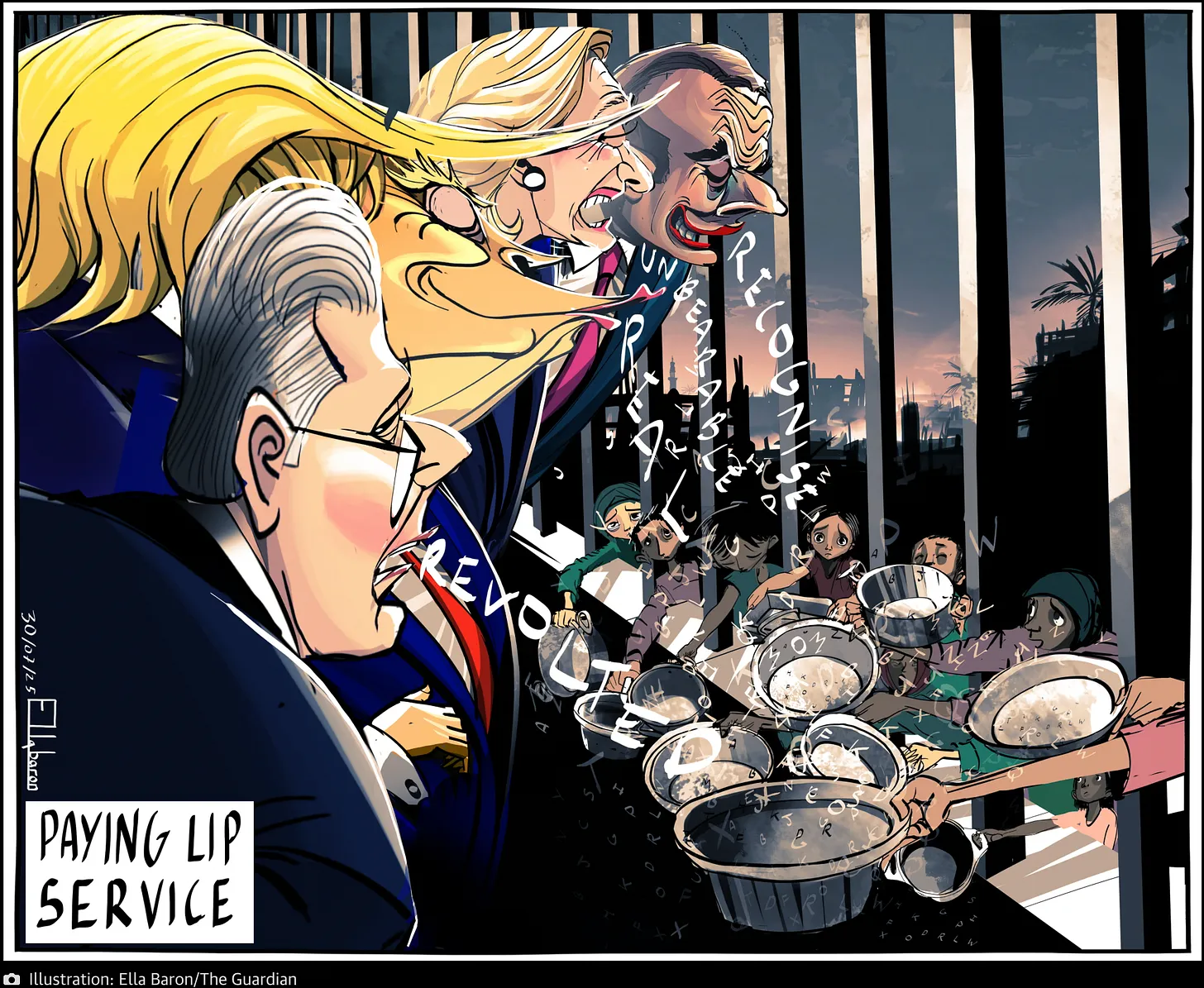
A Guardian cartoon on July 29 illustrating what the artist believes are the west’s empty words on the starvation in Gaza
It was a dramatic shift in Canadian foreign policy — and, to many, a hollow gesture.
On Wednesday, Prime Minister Mark Carney announced that Canada will formally recognize a Palestinian state at the UN General Assembly this September — but only if the Palestinian Authority (PA) agrees to a series of reforms. Among the conditions: holding general elections in 2026 and explicitly excluding Hamas from participating.
Coming amid what many human rights organizations have described as a genocide in Gaza — with over 50,000 Palestinians killed, including thousands of children — the announcement felt both momentous and deeply inadequate to many in the diaspora.
For decades, Canada has supported a two-state solution in rhetoric, but has consistently stopped short of formally recognizing Palestinian statehood. Successive Canadian governments have maintained close alignment with U.S. and Israeli policy, often opposing UN resolutions seen as critical of Israel, and limiting engagement with Palestinian leadership. Carney’s declaration marks the most significant departure from that stance in recent memory — but what does it actually mean, and how is it being received by Palestinian-Canadians?
Yesterday, I spoke with eight Palestinian-Canadians across generations about what this recognition means in the context of ongoing genocide, occupation, and displacement. Their perspectives are rarely reflected in mainstream coverage, a gap this Substack seeks to help fill.
James Kafieh: Vice-President of the Palestinian Canadian Congress, was born in Canada in 1959 to Palestinian parents from Jerusalem and Jaffa. His family was among the first Palestinian refugees displaced by the 1948 Nakba to arrive in Canada.
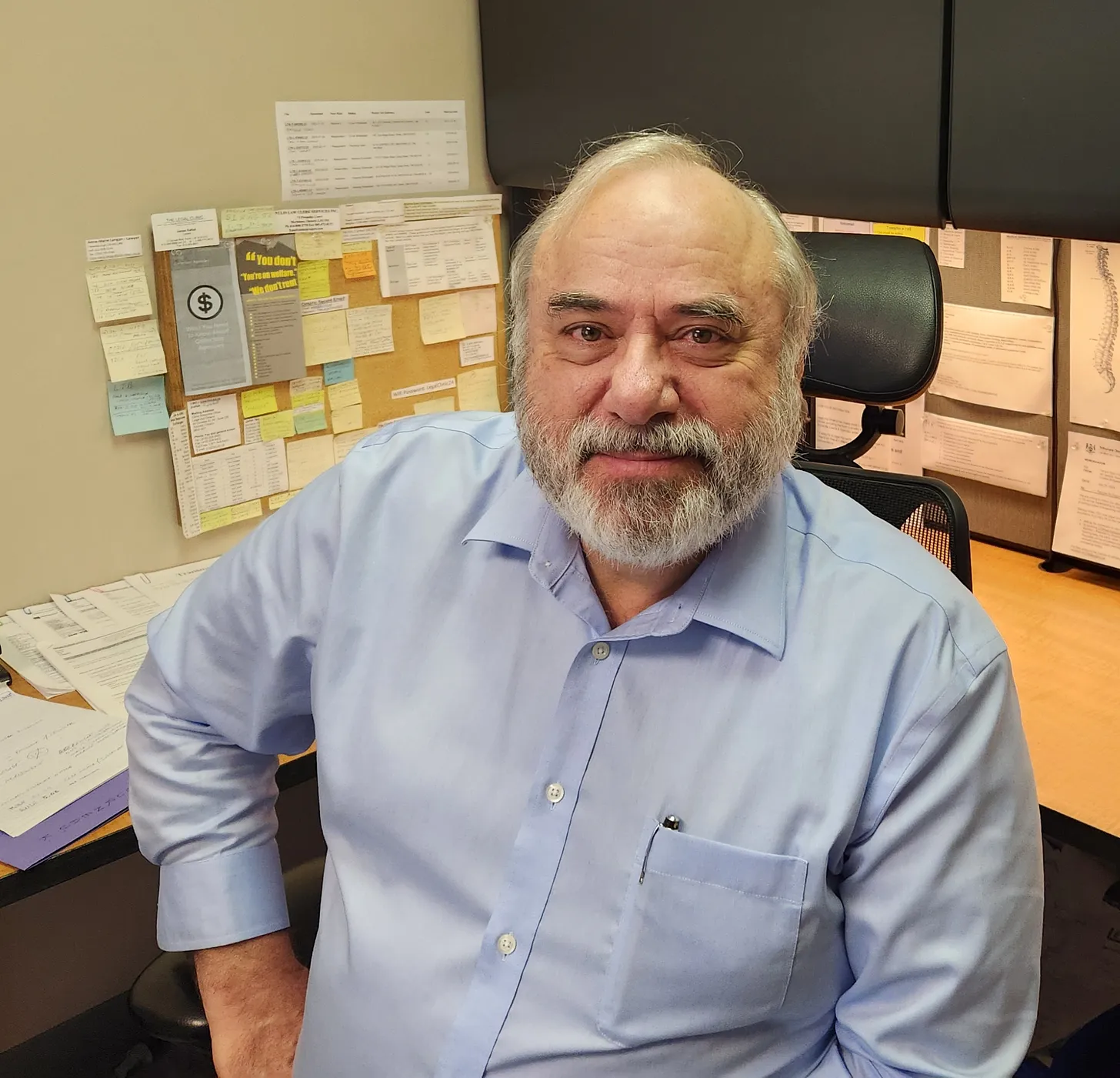
“It is very hard to describe the growing anguish that I have felt watching a genocide unfold and accelerate in Gaza. I have living memories of the 1967 Arab-Israeli war and each major event in the Middle East that followed. Yet, I have never before seen the emaciated skeletal bodies of Palestinian infants and toddlers.
Israel’s descent into depravity and genocide was fully expected to emerge over time. This is the natural progression for European colonial settlers seeking to establish an ethno-racial state. Their treatment of an excluded Indigenous population whose land they covet usually tracks to genocide.
However, it is the full support and collaboration of my Canadian government, in aiding, arming and abetting Israel during its genocide of the Palestinians of Gaza that leaves me with a profound sense of betrayal. I am astounded at how quickly the political class and ruling elite in Canada abandoned so-called, “Canadian values”, as well as all international law and human rights conventions, to protect Israel while it cut food and water, and all other vital necessaries of life to the defenceless civilian population in Gaza.
Carney’s declaration is welcome, but it’s long overdue. This is something that should have happened arguably 25 years ago in the wake of the Oslo Accords. There is a great deal that Canada has done over the last three decades that has actually undermined the two state solution… We have had gaslighting, where the government tells Canadians we’re not selling weapons to Israel. We’ve stopped, and yet we have an understanding that since the beginning of the genocide in Gaza, Canada, has sold about half a million bullets to the State of Israel [according to a new report released Wednesday].
175,000 bullets were sent in just April of this year. I wonder how many people lining up for food in Gaza have been shot with these bullets? I wonder how many of these bullets have landed into the hands of Israeli settler terrorists to be used against the Palestinian civilian population in the West Bank?
Prime Minister Carney is talking about an unarmed Palestinian state, and the theory being in part that you have to avoid a repeat of October 7 because of all the blood that Hamas is said to have on their hands. Well, I point out that the State of Israel has been conducting a genocide for 22 months. What about the blood on their hands?”
Nazih Khatatba: Editor-in-chief of Meshwar newspaper in Toronto, originally from Nablus
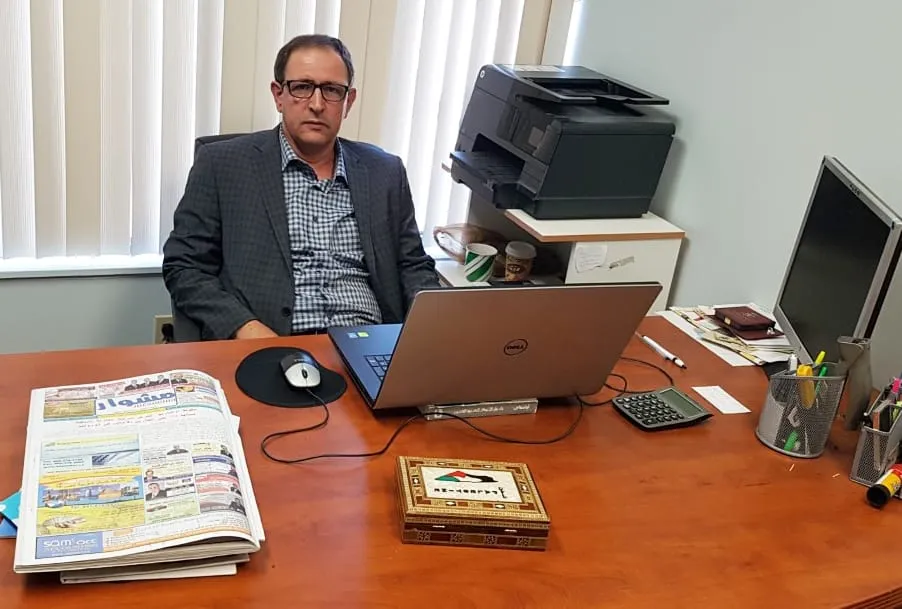
“Carney’s announcement can be considered a good step forward…and yet, tying Palestine’s recognition to the Palestinian Authority and [calling for] the removal of Hamas from the Palestinian political landscape, along with the disarmament of the resistance, raises numerous doubts and questions. Hamas and the resistance forces are part of the fabric of the Palestinian people, and excluding them is neither legitimate nor justifiable – and only the Palestinian people have the right to decide that through elections.
Also, Trump’s threats to Canada over recognizing the Palestinian state [Trump posted Thursday morning that recognizing a Palestinian state makes a trade deal with Canada “very hard”] confirms that Canada is moving in the right direction; it is rapidly distancing itself from political influence and subservience of the US.”
Rima: A graduate student at the University of Toronto. Her father, originally from Haifa, was forcibly displaced during the 1948 Nakba, and her mother is from Tulkarm in the occupied West Bank.
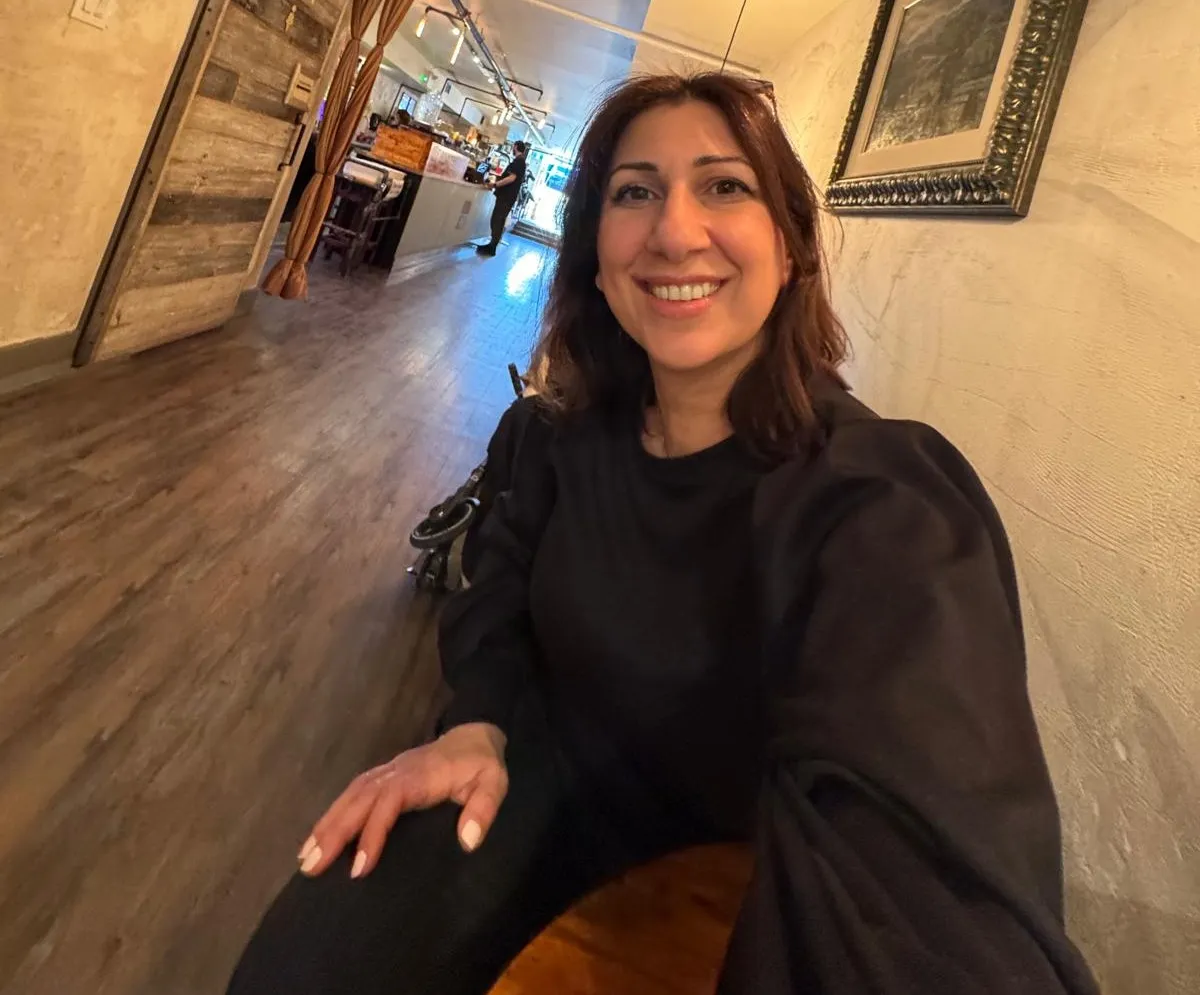
“It’s striking that Carney aligned with France and the UK before making this announcement; it feels more like geopolitical theatrics rather than moral obligation. What’s more troubling is the internal contradiction in his statement. He cites Hamas as the key obstacle to peace, but then openly acknowledges that the deeper, structural issues (ongoing settlement expansion, systematic settler violence, and the humanitarian blockades) are all driven by Israeli policy.
Yet somehow, the conditions for recognition fall entirely on the Palestinians. The message is clear: Palestinians must prove themselves worthy of statehood, while Israel continues its actions with full impunity and no binding demands. It’s hard not to see this as a deeply imbalanced approach that continues to shift the burden of peace onto the occupied, not the occupier.”
Also, Trump’s threats to Canada over recognizing the Palestinian state [Trump posted Thursday morning that recognizing a Palestinian state makes a trade deal with Canada “very hard”] confirms that Canada is moving in the right direction; it is rapidly distancing itself from political influence and subservience of the US.”
Ramy Shath: An urban planner from Gaza who now lives in Toronto. His entire immediate and extended family continue to live in Gaza; at least 35 of them have been killed.
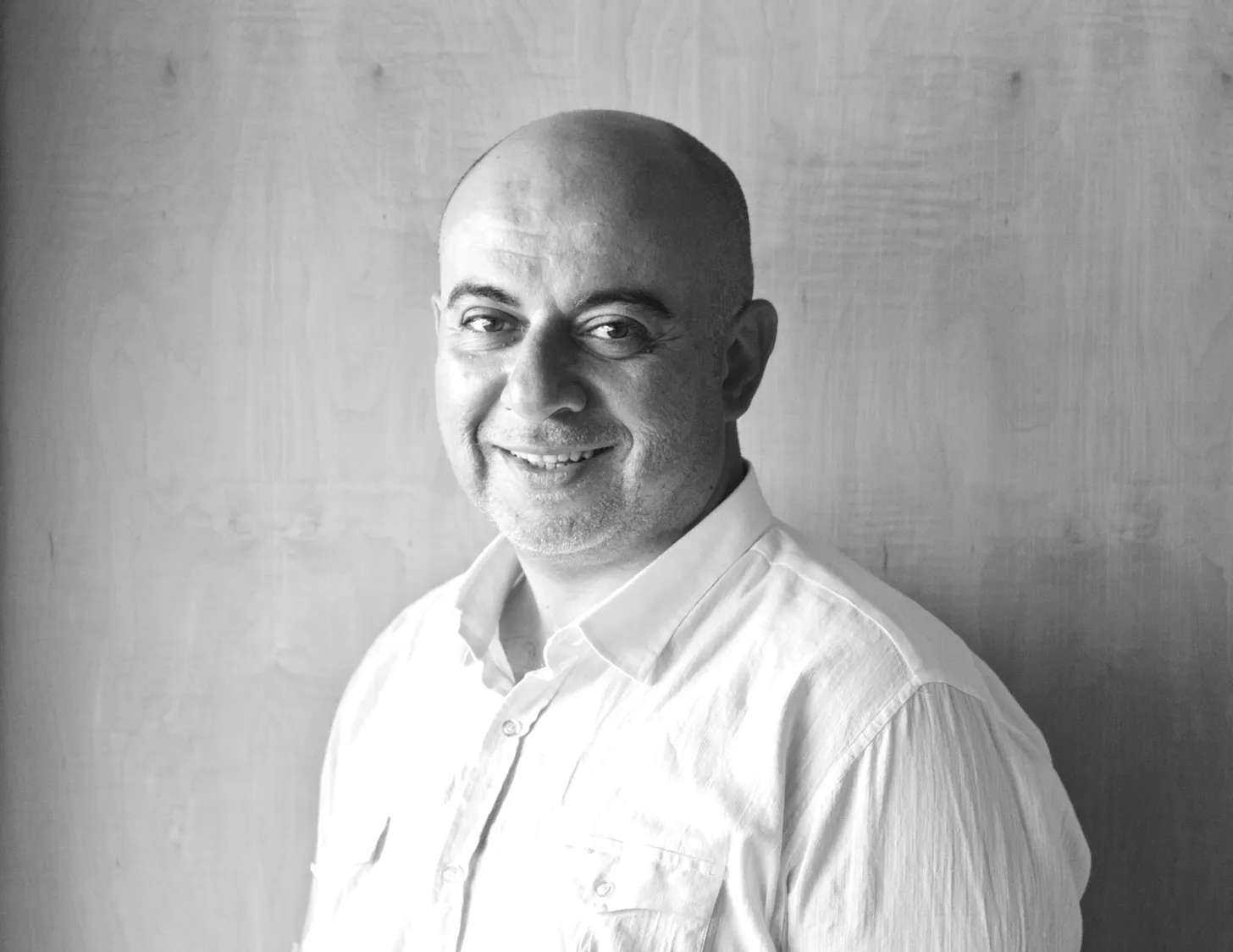
“All of our decisions and our means of daily life (in Gaza) are controlled by Israel. We cannot fly, or get out of our cities. We cannot produce anything. We cannot import machinery to make factories. We cannot build infrastructure. We cannot build buildings. We cannot bring materials. We cannot mine our own resources. We cannot go fishing, or we have limitations.
The enemy behind this genocide have no heart, no feeling. They have only the mindset that these people [Palestinians] don’t deserve to be alive.
Why do you [Israel and its allies] dehumanize me? My dad has been killed during this war. He was 78 years old, a business man; 90% of his business was done with Israel. My mom and family are displaced. Our homes and businesses are gone. What do you want me to do?
So where is the recognition of Palestine in a statehood that I have? Please stop this [killing] before announcing it… It’s not a matter of announcing it. It’s a matter of applying it.”
Mohammad Rasoul Kailani: Jordanian-Palestinian student at University of Toronto and member of Bridging the Gap, an Israel/Palestine dialogue group.
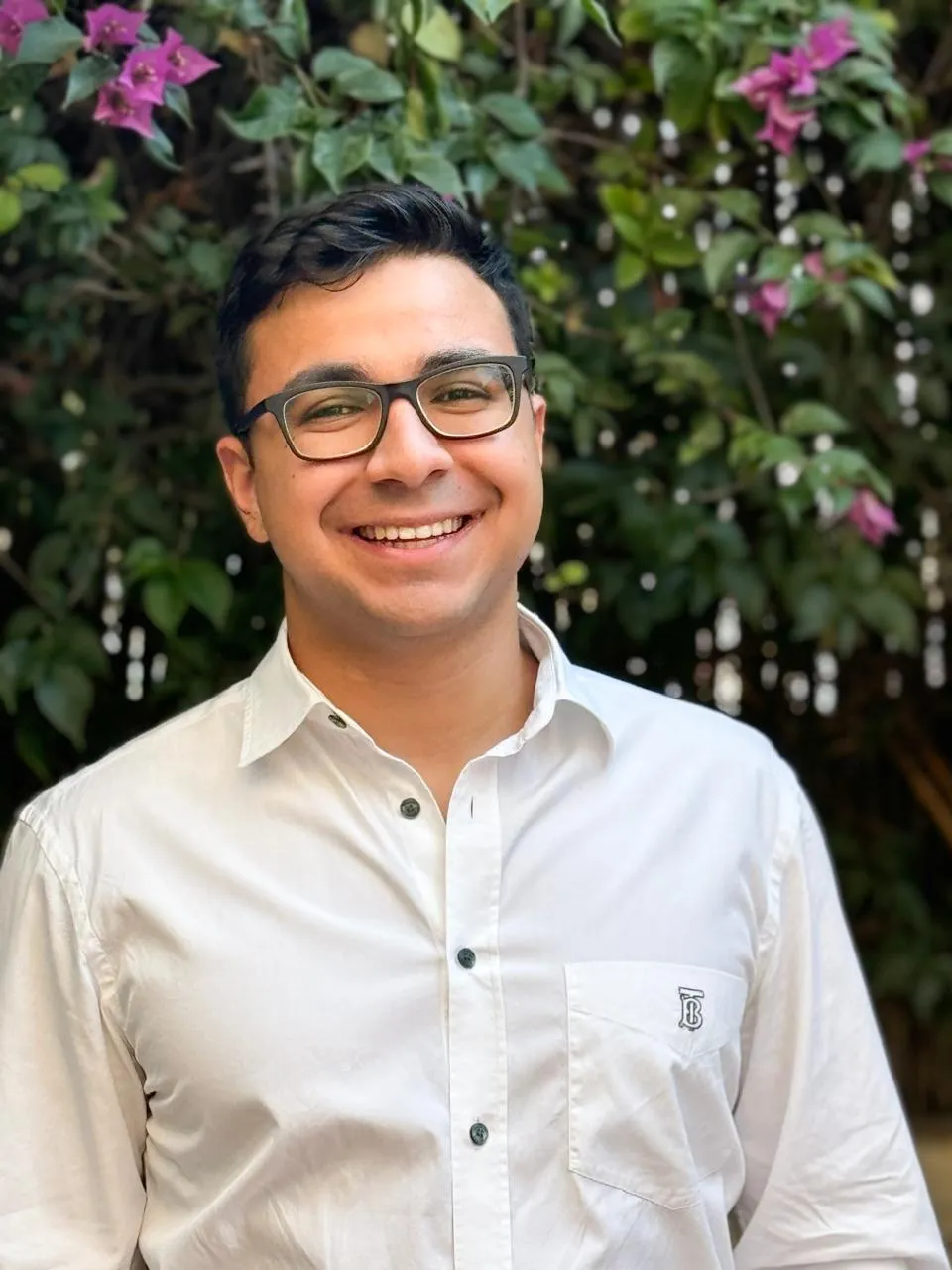
“I think this statement is definitely a step in the right direction, because, firstly, it’s not just Canada. It was preceded by a statement from the French President and the Prime Minister of the UK. We see a lot of the Western countries, NATO members, taking the step forward in recognition of the Palestinian state. It shows that young people and the voting public in general think differently about this issue. Granted, it’s not going to solve everything overnight, right? I mean, I don’t even know if, practically speaking, a two state solution is viable anymore.
But I just find it absurd. A lot of Israelis, Zionists and people that are misinformed have the contention that the Palestinian people as a nation don’t exist. So when I go into Bridging the Gap dialogues, there’s an air of legitimacy when we say: ‘Look, at the end of the day, no matter what you think, this country [Canada] recognizes a Palestinian state, meaning they recognize the Palestinian people and their right to self determination.’ And so in any discussion [about Israel-Palestine] the existence and the legitimate rights and aspirations of the Palestinian people are a very important jumping off point.
Carney’s decision is a welcome one, and it serves as an obstacle to those in Canada and outside of Canada who believe or who push a narrative of Palestinians not existing. And Donald Trump has said that Canada’s initiative to recognize Palestine jeopardizes a potential trade deal… there’s a trend of all these traditional middle countries kind of diverging with Americans on this issue. It was Bashar Al Shawwa [a researcher on conflict resolution featured below] who said this in one of the Bridging the Gap sessions: That Trump is driving a wedge between himself and the rest of the global community, particularly Western allies. So the fact that governments, like the Canadian government and the British government have a problem with everything else Trump stands for, it follows that they’re going to eventually diverge on Trump’s position on the Palestinian issue, which is an abysmal position, a Zionist position.
The existence of Palestine, of the Palestinian people, becoming a standard fact amongst the public and not an opinion is so significant that the more I think about it, the more I realize how important it is. I remember seeing a video by like an Instagram personality, Maya Abdullah. She’s half Palestinian, half Lebanese, and [recalled once] doing a classroom projects about homelands. She wanted to do Palestine and the teacher straight up told her Palestine doesn’t exist, and it becomes this political controversy. There have been so many cases of Palestinian students doing university or job applications and avoiding Palestine or just saying they’re from a nearby country because they’d rather forego the controversy and consequences that could have on their future. This is huge; it opens a lot of doors and really changes public perception.”
The enemy behind this genocide have no heart, no feeling. They have only the mindset that these people [Palestinians] don’t deserve to be alive.
Why do you [Israel and its allies] dehumanize me? My dad has been killed during this war. He was 78 years old, a business man; 90% of his business was done with Israel. My mom and family are displaced. Our homes and businesses are gone. What do you want me to do?
So where is the recognition of Palestine in a statehood that I have? Please stop this [killing] before announcing it… It’s not a matter of announcing it. It’s a matter of applying it.”
Bashar Alshawwa: Researcher and expert in international political affairs and conflict resolution from Gaza, now in Toronto
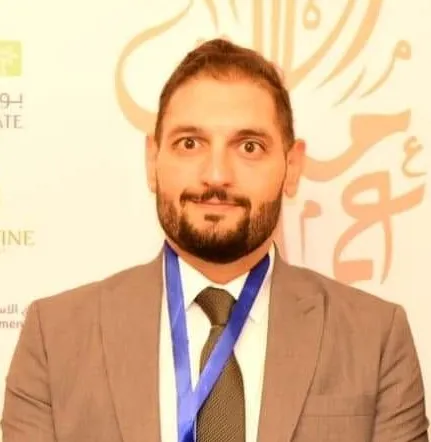
“This recognition is not a reward for the Palestinians or a punishment for the Israelis. This should be a genuine act of recognizing the right of the Palestinian people to self-determination. The conditions required from the Palestinian side are a milestone, but they carry a double standard when they do not demand compliance from the other side. Completing the imposition of sanctions on all components of the Israeli government and extending them to include all aspects of the state, as happened when the Palestinian people were punished when Palestinian democracy produced the election of Hamas, which led to the imposition of comprehensive sanctions on the Palestinian people.
There’s an unclear part related to using this recognition as pushing Israel to allow aid to Gaza. So if Israel allows aid, Canada will freeze the recognition process?”
But I just find it absurd. A lot of Israelis, Zionists and people that are misinformed have the contention that the Palestinian people as a nation don’t exist. So when I go into Bridging the Gap dialogues, there’s an air of legitimacy when we say: ‘Look, at the end of the day, no matter what you think, this country [Canada] recognizes a Palestinian state, meaning they recognize the Palestinian people and their right to self determination.’ And so in any discussion [about Israel-Palestine] the existence and the legitimate rights and aspirations of the Palestinian people are a very important jumping off point.
Carney’s decision is a welcome one, and it serves as an obstacle to those in Canada and outside of Canada who believe or who push a narrative of Palestinians not existing. And Donald Trump has said that Canada’s initiative to recognize Palestine jeopardizes a potential trade deal… there’s a trend of all these traditional middle countries kind of diverging with Americans on this issue. It was Bashar Al Shawwa [a researcher on conflict resolution featured below] who said this in one of the Bridging the Gap sessions: That Trump is driving a wedge between himself and the rest of the global community, particularly Western allies. So the fact that governments, like the Canadian government and the British government have a problem with everything else Trump stands for, it follows that they’re going to eventually diverge on Trump’s position on the Palestinian issue, which is an abysmal position, a Zionist position.
The existence of Palestine, of the Palestinian people, becoming a standard fact amongst the public and not an opinion is so significant that the more I think about it, the more I realize how important it is. I remember seeing a video by like an Instagram personality, Maya Abdullah. She’s half Palestinian, half Lebanese, and [recalled once] doing a classroom projects about homelands. She wanted to do Palestine and the teacher straight up told her Palestine doesn’t exist, and it becomes this political controversy. There have been so many cases of Palestinian students doing university or job applications and avoiding Palestine or just saying they’re from a nearby country because they’d rather forego the controversy and consequences that could have on their future. This is huge; it opens a lot of doors and really changes public perception.”
The enemy behind this genocide have no heart, no feeling. They have only the mindset that these people [Palestinians] don’t deserve to be alive.
Why do you [Israel and its allies] dehumanize me? My dad has been killed during this war. He was 78 years old, a business man; 90% of his business was done with Israel. My mom and family are displaced. Our homes and businesses are gone. What do you want me to do?
So where is the recognition of Palestine in a statehood that I have? Please stop this [killing] before announcing it… It’s not a matter of announcing it. It’s a matter of applying it.”
Dalia: Equity, diversity, inclusion and education advisor at a Toronto university, originally from Khan Younis, Gaza. Israel has killed over 300 of her family members since 2023.
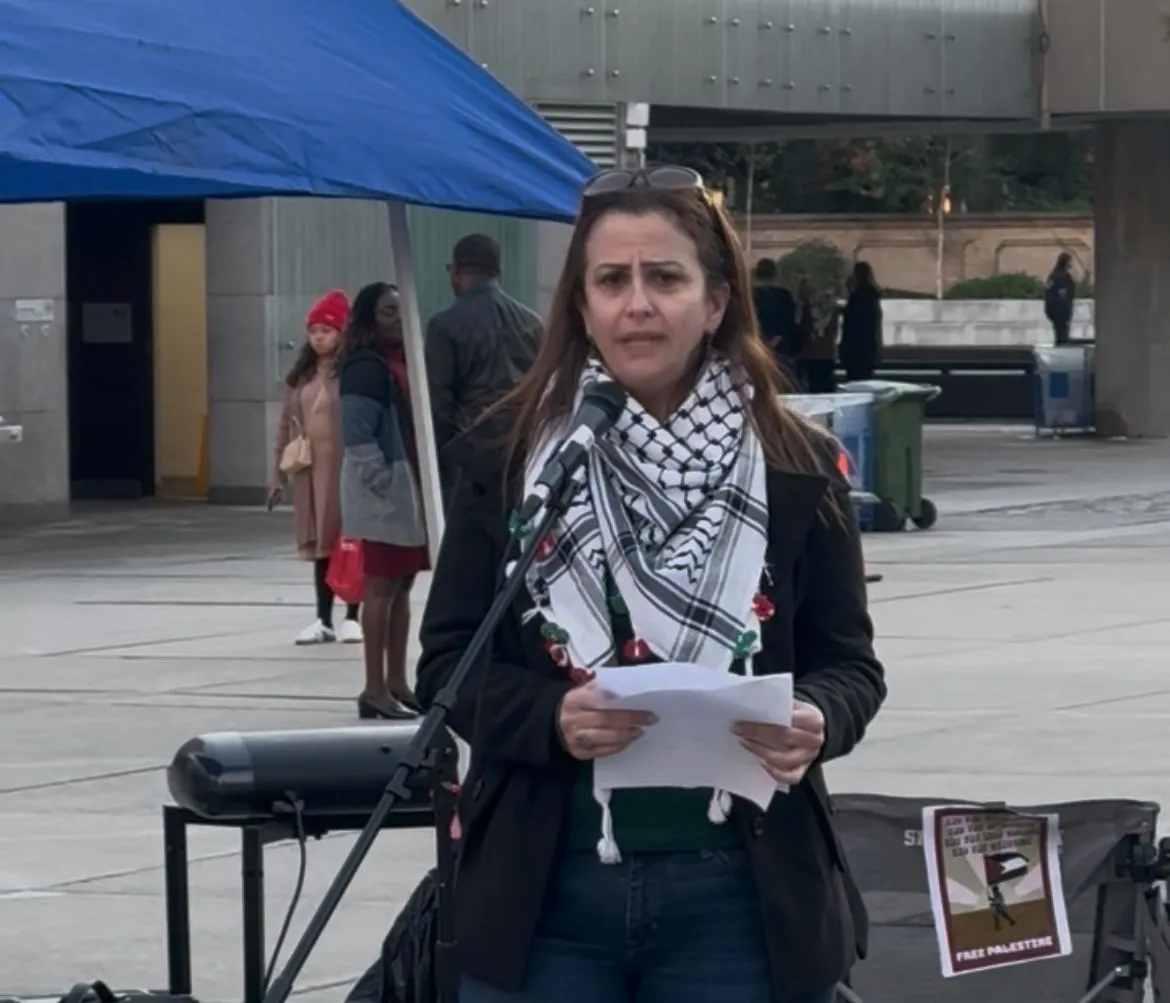
“The foremost priority right now must be ending the genocide in Gaza and taking immediate action to save lives. Every hour of delay means more Palestinians, many of them children, are killed, maimed, starved, or made to suffer unimaginable trauma. This is not a moment for political deflection or concern over optics. It is a moment that demands moral courage, clarity, and action.
Canada has an important role on the international stage, yet has failed to use this position to push for a full arms embargo on Israel or to halt Canada’s complicity in the destruction of Gaza.
While recent statements from the Canadian government about recognizing a Palestinian state may seem like progress, they ring hollow without concrete steps to stop the killing and starving of Palestinians today. Recognition means nothing if it is symbolic while Canada continues to export arms to Israel and avoids applying meaningful pressure to end
There’s an unclear part related to using this recognition as pushing Israel to allow aid to Gaza. So if Israel allows aid, Canada will freeze the recognition process?”
But I just find it absurd. A lot of Israelis, Zionists and people that are misinformed have the contention that the Palestinian people as a nation don’t exist. So when I go into Bridging the Gap dialogues, there’s an air of legitimacy when we say: ‘Look, at the end of the day, no matter what you think, this country [Canada] recognizes a Palestinian state, meaning they recognize the Palestinian people and their right to self determination.’ And so in any discussion [about Israel-Palestine] the existence and the legitimate rights and aspirations of the Palestinian people are a very important jumping off point.
Carney’s decision is a welcome one, and it serves as an obstacle to those in Canada and outside of Canada who believe or who push a narrative of Palestinians not existing. And Donald Trump has said that Canada’s initiative to recognize Palestine jeopardizes a potential trade deal… there’s a trend of all these traditional middle countries kind of diverging with Americans on this issue. It was Bashar Al Shawwa [a researcher on conflict resolution featured below] who said this in one of the Bridging the Gap sessions: That Trump is driving a wedge between himself and the rest of the global community, particularly Western allies. So the fact that governments, like the Canadian government and the British government have a problem with everything else Trump stands for, it follows that they’re going to eventually diverge on Trump’s position on the Palestinian issue, which is an abysmal position, a Zionist position.
The existence of Palestine, of the Palestinian people, becoming a standard fact amongst the public and not an opinion is so significant that the more I think about it, the more I realize how important it is. I remember seeing a video by like an Instagram personality, Maya Abdullah. She’s half Palestinian, half Lebanese, and [recalled once] doing a classroom projects about homelands. She wanted to do Palestine and the teacher straight up told her Palestine doesn’t exist, and it becomes this political controversy. There have been so many cases of Palestinian students doing university or job applications and avoiding Palestine or just saying they’re from a nearby country because they’d rather forego the controversy and consequences that could have on their future. This is huge; it opens a lot of doors and really changes public perception.”
The enemy behind this genocide have no heart, no feeling. They have only the mindset that these people [Palestinians] don’t deserve to be alive.
Why do you [Israel and its allies] dehumanize me? My dad has been killed during this war. He was 78 years old, a business man; 90% of his business was done with Israel. My mom and family are displaced. Our homes and businesses are gone. What do you want me to do?
So where is the recognition of Palestine in a statehood that I have? Please stop this [killing] before announcing it… It’s not a matter of announcing it. It’s a matter of applying it.”
Dr Mohammad Yaghi: Independent researcher and columnist at the Palestinian Al-Ayyam newspaper in Ramallah; Since October 2023, 52 family members have been killed by Israel
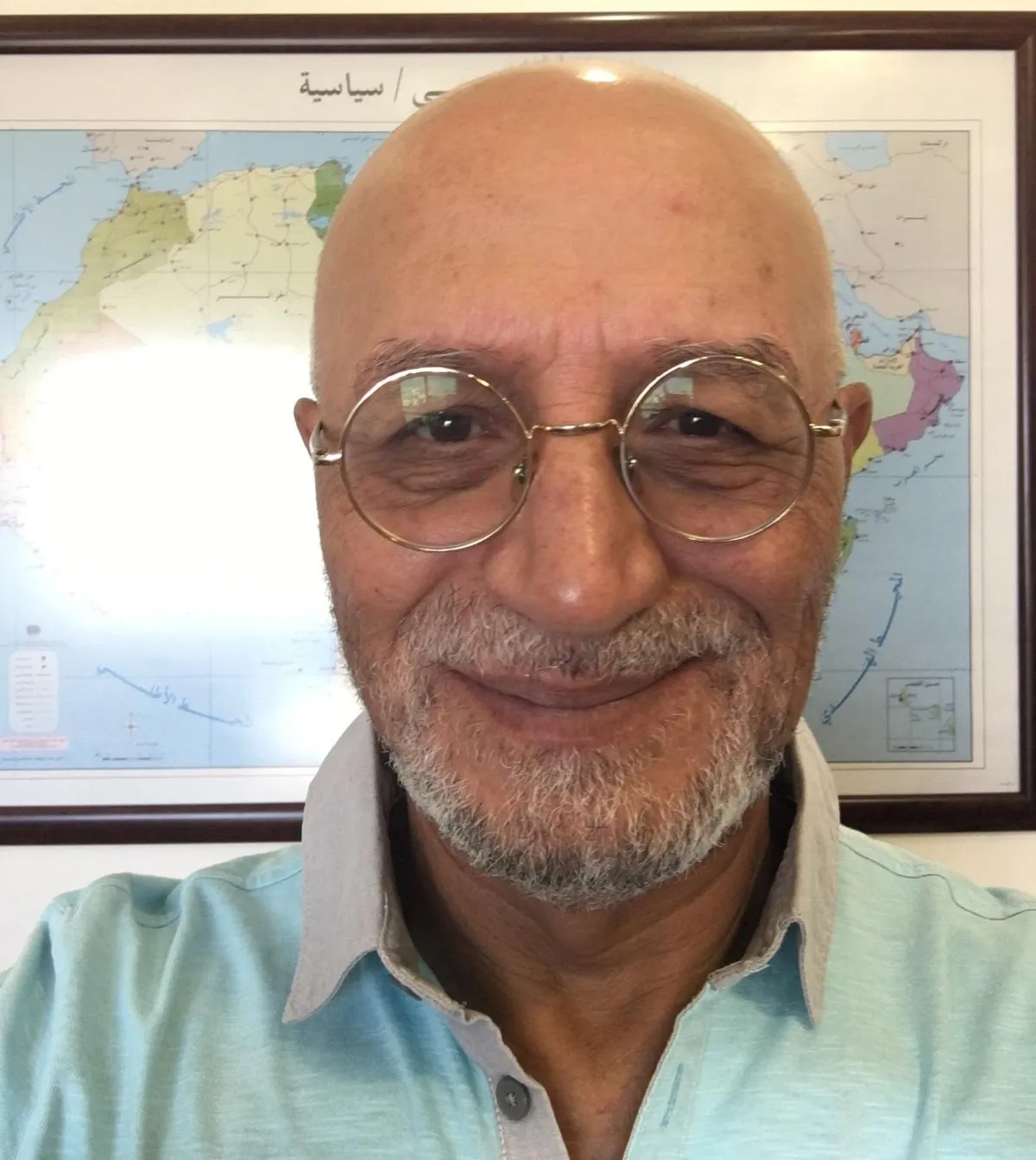
“The French decision to recognize the Palestinian state this coming September.. and the statements by British Prime Minister Keir Starmer, followed by Canadian Prime Minister Mark Carney, expressing their countries’ intention to do the same if Israel does not end its war on Gaza… is likely to pave the way for other European countries—except for a few like Hungary and Germany—to recognize the Palestinian state. This recognition could eventually lead, if popular mobilization in Western countries continues, to the imposition of a boycott on the occupying state, which is more consequential than the recognition itself.
In any case, these European intentions to recognize the Palestinian state should not prevent us from seeing a number of facts that render such recognition incomplete—and reveal it also as an attempt to cover up their complicity in the genocidal war on Gaza. In this context, several points are worth noting:
This recognition is conditional upon reforming the Palestinian Authority. It is worth recalling that European countries themselves led the PA reform process, including the imposition of changes to the Palestinian Basic Law in 2004 to create the position of Prime Minister and strip powers from the late President Yasser Arafat. Anyone who reviews previous European Union reports will find that they praised the PA’s reforms, which were conducted under their sponsorship and oversight. Therefore, the renewed call for reforms is puzzling—it appears to offer the occupying state a convenient pretext to evade the obligation of recognizing Palestinian statehood, by claiming that the PA has yet to implement the necessary reforms.
This recognition is also conditional on the disarmament of the Palestinian resistance—a truly perplexing demand. If the occupying state has failed to achieve this after two years of genocidal war, how is the Palestinian Authority expected to do so? Unless, of course, the real aim of this condition is to spark a Palestinian civil war that would ultimately serve the interests of the occupying power. This vision appears to be inspired by the case of Lebanon, where pressure is being placed on the Lebanese government to forcibly disarm Hezbollah for the benefit of Israel. Moreover, this conditional recognition makes no reference to any UN resolutions that define the borders of the Palestinian state.”
This contribution from Dr Yaghi is an excerpt of his weekly column, published today in Al-Ayyam.
Canada has an important role on the international stage, yet has failed to use this position to push for a full arms embargo on Israel or to halt Canada’s complicity in the destruction of Gaza.
While recent statements from the Canadian government about recognizing a Palestinian state may seem like progress, they ring hollow without concrete steps to stop the killing and starving of Palestinians today. Recognition means nothing if it is symbolic while Canada continues to export arms to Israel and avoids applying meaningful pressure to end
There’s an unclear part related to using this recognition as pushing Israel to allow aid to Gaza. So if Israel allows aid, Canada will freeze the recognition process?”
But I just find it absurd. A lot of Israelis, Zionists and people that are misinformed have the contention that the Palestinian people as a nation don’t exist. So when I go into Bridging the Gap dialogues, there’s an air of legitimacy when we say: ‘Look, at the end of the day, no matter what you think, this country [Canada] recognizes a Palestinian state, meaning they recognize the Palestinian people and their right to self determination.’ And so in any discussion [about Israel-Palestine] the existence and the legitimate rights and aspirations of the Palestinian people are a very important jumping off point.
Carney’s decision is a welcome one, and it serves as an obstacle to those in Canada and outside of Canada who believe or who push a narrative of Palestinians not existing. And Donald Trump has said that Canada’s initiative to recognize Palestine jeopardizes a potential trade deal… there’s a trend of all these traditional middle countries kind of diverging with Americans on this issue. It was Bashar Al Shawwa [a researcher on conflict resolution featured below] who said this in one of the Bridging the Gap sessions: That Trump is driving a wedge between himself and the rest of the global community, particularly Western allies. So the fact that governments, like the Canadian government and the British government have a problem with everything else Trump stands for, it follows that they’re going to eventually diverge on Trump’s position on the Palestinian issue, which is an abysmal position, a Zionist position.
The existence of Palestine, of the Palestinian people, becoming a standard fact amongst the public and not an opinion is so significant that the more I think about it, the more I realize how important it is. I remember seeing a video by like an Instagram personality, Maya Abdullah. She’s half Palestinian, half Lebanese, and [recalled once] doing a classroom projects about homelands. She wanted to do Palestine and the teacher straight up told her Palestine doesn’t exist, and it becomes this political controversy. There have been so many cases of Palestinian students doing university or job applications and avoiding Palestine or just saying they’re from a nearby country because they’d rather forego the controversy and consequences that could have on their future. This is huge; it opens a lot of doors and really changes public perception.”
The enemy behind this genocide have no heart, no feeling. They have only the mindset that these people [Palestinians] don’t deserve to be alive.
Why do you [Israel and its allies] dehumanize me? My dad has been killed during this war. He was 78 years old, a business man; 90% of his business was done with Israel. My mom and family are displaced. Our homes and businesses are gone. What do you want me to do?
So where is the recognition of Palestine in a statehood that I have? Please stop this [killing] before announcing it… It’s not a matter of announcing it. It’s a matter of applying it.”

